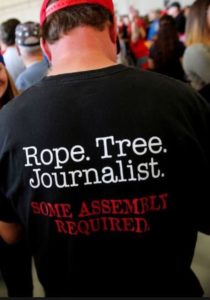The Fourth Estate is in serious trouble.
[The nation is in the midst of a continuing crisis of distraction that is weakening the habit of consuming reliable journalism].

If we want to understand how far our civil life has drifted of course we can look to what has happened to the “Fourth Estate.” That phrase was coined by a British parliamentarian Edmund Burke and adapted by American writers to describe one of the essential parts of any democracy. A free press is what Americans now understand as the fourth addition to the three formal branches of government (Congress, the presidency and the courts). Together they work as checks on each other: a fact that is well illustrated in the First Amendment, guaranteeing a free press. Interestingly, the practice of journalism is the only profession singled out for protection in the Constitution.
We have drifted into uncharted territory when the press is no longer able to function as our eyes and ears tuned to the other three branches. I’m repeating an obvious but vital warning: the nation is adrift because we are losing the compass of the Fourth Estate. The problem is not primarily the fault of news organizations, but with those of us who no longer feel motivated to make room for the news media. The nation cannot function without a vital press and motivated news readers. Video news helps, but it tends to shun ideas in favor of action. We need the longer view that a text-rich medium more naturally provides.

The decline of the American newspaper now has its own history. Independent owners have nearly disappeared as big city papers have closed or been bought up by chains. It can be hard to find a newspaper to buy in a big city. And the papers that remain have dramatically reduced their reporting staffs. It’s also an obvious fact of modern life that younger Americans mostly consume news in fragments, having been given the endless distractions of social media. There is great reporting that remains, but the outlets producing need-to-know stories are on a shrinking list of outlets unknown to a growing portion of the population.
We can count ourselves fortunate to still have organizations like The New York Times, Los Angeles Times and Wall Street Journal. Ditto for opinion outlets like The Atlantic and The Economist. And The Associated Press still provides on site coverage of major political developments that remaining news organizations still use. But it seems that fewer media managers want straight reporting, opting for the creation of reality-based fantasies like those favored by Fox News and Newsmax. The differences between reporting and opinion-giving haven’t changed. Real reporters depend on facts and accounts of the observable to shape their journalism. News polemicists are freer to let their imaginations shape their conclusions. Calvin Trillin recalls that old-line reporters would call these self-satisfied pieces “thumb suckers.” And, of course, facts alone can be selectively chosen or ignored. But we better start teaching young news consumers the critical tools needed to weigh claims and evidence. (What that unit of education might look like is taken up in the next blog.) The current pattern of catching passing glimpses of national events on platforms like TicTok and Facebook will doom us low levels of understanding that will cripple our capacity for self-government.
“Your audience has halved in recent years. People are not reading your stuff.”
This grim view of the future of quality journalism was brought home in the last few weeks by the resignation of Editor Sally Buzbee at the Washington Post. Prior to her decision she refused to pull an article that mentioned the Post’s publisher, Will Lewis, as among those allegedly involved in a scheme years ago to hack into the private communications of Prince Harry and other royals. At the same time, Lewis reminded observers of his roots in the sometimes shabby standards of British journalism by trying to kill that bit of news as it was being prepared by NPR’s media reporter. The quid-pro-quo for not running the story would be an exclusive interview with the radio network. Lewis was brought on by owner Jeff Bezos to turn around falling circulation figures: a fact brought home to staffers in an early meeting. “We are losing large amounts of money. Your audience has halved in recent years,” the new arrival declared. “People are not reading your stuff.”
The Post remains one of the great American news outlets. It is disheartening it should be in so public a feud, and doubly so if the root cause is declining circulation numbers. Less scrupulous news-creation techniques of some popular forms of the press are no cure for the underlying problem of declining public interest. Will we be able to sustain a vigorous fourth branch of government when the other three legs of our civil life are so wobbly?
Before he passed away this month, political reporter Howard Fineman worked at many “legacy” news organizations like Newsweek. But he also added a sober observation about their tenuous status. “We are in what I view as a new global world war for control of the search for the truth,” he noted. “We have to mobilize our truth-seeking strength . . . for America and democracy to survive.”



